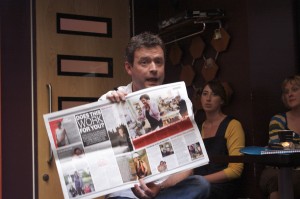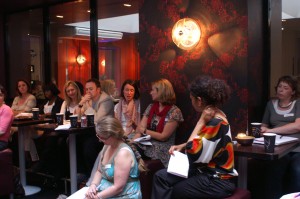media parents 1st flexible working meeting notes 3
November 4, 2010 @ 7:55 pm Posted in Events, News CommentsHere is a one in a series of summaries of comment from the first Media Parents flexible working meeting.
Karl Burnett – HR Director – BBC Vision “It’s not about attendance, it’s about output – the vast majority of flexible working won’t have any extra cost and will actually save money”.
Karl agreed that the Broadcasters should lead the way with flexible working and he was alarmed by the figures that Emily had stated. Since 2005 the numbers of people at the BBC working part-time has increased from 11.1% to 12.7%. In News some 32% work part-time, but Karl said there is nothing innovative about this, but instead it’s solid policy and a good attitude to different style of working. The BBC has extended the law so that it is not just parents who can request flexible working, but anyone who wants to do it.
The types of flexible working at BBC are; term-time only, from home, unpaid leave and job sharing. Karl also showed a copy of the week’s Ariel magazine which contained the article, ‘Does flexible working work for you?’ (we are asking Ariel for permission to reprint this).
He did say there was a long way to go still, and although some 32% of Senior Management work flexibly, it’s not the same at more junior levels.
He also noted we should recognise that big employers need to enable flexible working, and the BBC can be a model for this kind of behaviour. Karl did acknowledge that for small companies and small teams flexible working can have a big impact.
Karl used to work at Nickelodeon with far fewer employees than the BBC, and they had returners coaching for new mums coming back to work. Even as a smaller company they recognised the need for this.
At the BBC 87% of new mums return to work and 90% return to work in the News department. Employers should think of flexible working as a culture, not just policy, and managers need to see the positive side to this, and not as onerous. Actually, part-time work can be more effective than full-time, as more hours can be worked by a part-timer.
Managers should not be afraid part time work can help drive the productivity.
Gaps in the workforce are not a bad thing – changing jobs and having placements elsewhere can all be positive.
When working at Channel 4, Karl said there were efforts to help flexible working. Workshops were held with key managers being asked what their fears were about including flexible working employees. The workshops would then seek to show the benefits to these employers too. He felt that the important issue was that it was a two-way street between employer and employee. A job share can be a nightmare, but mostly they work really well. His advice is to try a job share, and then be happy to tweak it if necessary. Individuals who do job share should be mindful of impact on the rest of the team.
Next: Helen Veale – Joint MD and Creative Director, Outline Productions. Reacting to Karl, Helen said she believed that “the lack of flexible working isn’t cultural, it’s economic.”


